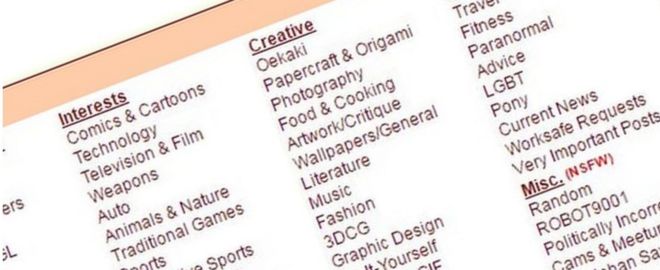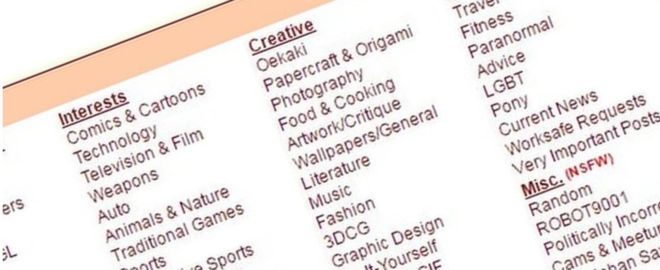
One of the most notorious corners of the web could be about to become a victim of its own success.
The owner of 4chan posted a warning last weekend that the anarchic bulletin board service was in financial straits.
“What I wrote on 4chan was true,” Hiroyuki Nishimura told the BBC.
“Ad [revenue] is getting worse and costs are getting high because of more users.”
While some would not mourn its loss, others would miss its influence and sense of mayhem.
What do people do on 4chan?
 Image copyrightREUTERS
Image copyrightREUTERSThe site provides a place to anonymously post text and images about a range of interests, including Japanese anime, video games, cooking, science and cars.
But what keeps many of its 27 million users coming back for more are its more controversial pages.
These include the “politically incorrect” board, in which racist and homophobic comments run rampant.
It has been linked to the rise of the so-called alt-right movement, whose followers are outspoken in their attacks on multiculturalism, globalisation and immigration even if they differ on much else.
Many visitors also head straight to the “random” board, after passing a notice that warns of its mature and potentially damaging content.
 Image copyrightGETTY IMAGES
Image copyrightGETTY IMAGESMany of the posts are pornographic and otherwise shocking in nature. It was here that stolen images of naked celebrities were posted following hacks in 2014.
There are several other boards on the site dedicated to adult pictures and videos.
But people also visit to engage in the kind of humour that might get them in trouble elsewhere.
Why is 4chan in difficulties?
 Image copyright4CHAN
Image copyright4CHANMr Nishimura posted a message on 4chan’s question-and-answer board on Sunday, headlined: “winter is coming” – a reference to Game of Thrones.
He said the site could no longer afford its computer servers and other infrastructure costs.
Chris Poole – the site’s founder, who now works at Google – had attempted to make 4chan profitable in 2013 by setting up a tool that allowed advertising campaigns to be run on the site for as little $20 (£15.60).
But many of 4chan’s users have ad-blockers – so they never see the promotions – and the controversial nature of the posts means many businesses do not want to have anything to do with it anyway.
Is there a way out?
 Image copyrightGETTY IMAGES
Image copyrightGETTY IMAGESMr Nishimura’s post suggested several potential solutions, including:
- reduce traffic by limiting the size of image posts
- close some of 4chan’s boards
- serve more adverts including pop-ups and even “malicious ads”
- add more features to its premium 4chan Pass scheme. It currently charges $15 (£12) a year to let users post content without having to complete a Captcha test to confirm they are not a bot
He has already started pursuing the last of these options.
On Tuesday, 4chan added a VIP board, which anyone can read but only Pass holders can post to.
Mr Nishimura told the BBC other steps were also under way.
“4chan is working on scripts to delete unnecessary HTML tags and images to reduce bandwidth cost at this time,” he said.
“We [have] started to work with non-harmful ways for users at first. Then, we’ll try tough ways.”
Markus “Notch” Persson – the creator of Minecraft – tweeted that he was interested in helping, before deleting the post.
It seems nothing has come of this as yet.
The former chief executive of Turing Pharmaceuticals, Martin Shkreli, has also said that he would be interested in helping run the site.
The entrepreneur is best known for buying the rights to a drug and then raising its price from $13.50 to $750 per pill.
“Martin has a talent for sure,” Mr Nishimura said.
“People… confirm his skills to make money. I don’t know much about his personality, though.
“4chan is struggling to survive. Any help is welcome.”
Would anyone, apart 4channers themselves, actually miss the site?
 Image copyrightGETTY IMAGES
Image copyrightGETTY IMAGESWhile most of 4chan’s content stays within its walls, the site has repeatedly had influence on the wider world.
Perhaps most notably, it is thought to be the birthplace of the Anonymous movement.
The hacktivists are said to have taken on the name as a nod to the fact all posts to the site have been marked as being posted by “anonymous” rather than another username since 2004.
The singer Rick Astley can thank 4chan for helping revitalise his career, due to a user creating the Rickrolling meme – in which one of his music videos is shared under false pretences.
And cat-lovers can be grateful for the Lolcats meme, in which oddly phrased text is superimposed over a photo of a feline.
Supporters of Donald Trump can point to 4chan helping drive support for the presidential candidate among the under-30s.
 Image copyrightGETTY IMAGES
Image copyrightGETTY IMAGESAnd pranksters would undoubtedly miss its ability to hijack online votes. Examples include:
- causing North Korea’s Kim Jong-un to win the poll for Time’s person of the year
- making the rapper Pitbull travel to remote Alaska after Walmart promised he would visit its most Facebook-liked store
- making a 39-year-old man who wanted to sniff Taylor Swift’s hair top the leader-board in a contest to meet the singer
- causing Diabeetus and Hitler Did Nothing Wrong to top the vote in a contest for a new soft drink name, held by Mountain Dew
Perhaps most critical of all is that 4chan provides a place for likeminded people to hang out online – and several other comment sites are already concerned what an influx of its former users would mean if it failed.
[Source:-BBC]



